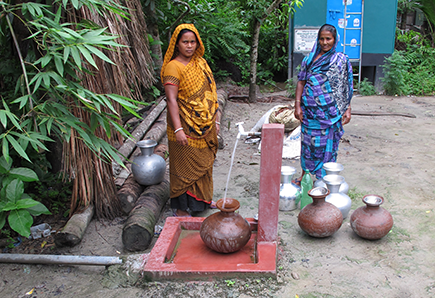Co-occurrence of heavy metal and antibiotic resistance in microorganisms due to arsenic contamination in water insecure areas of Bangladesh
Many regions of Bangladesh are water insecure due to severe contamination of groundwater. Around one in five wells are contaminated with arsenic above the government’s maximum limit for drinking water (50μg/L), putting people at risk of arsenic poisoning and related health problems such as cancer, cardiovascular disease, and respiratory illness.
To add to concerns, there is growing evidence that arsenic exposure may contribute to the development of antibiotic resistance in bacteria. Recent studies suggest that microorganisms exposed to heavy metals, like arsenic, develop resistance mechanisms that also provide the microorganisms with resistance to antibiotics. Therefore, people drinking from arsenic contaminated water may have more antibiotic resistant organisms in their gut, increasing their risk of disease related to antibiotic resistant bacterial infections.
Being studied for the first time in humans, this project explores the relationship between arsenic contamination, antibiotic resistant bacteria in the gut, and health. It focuses on two vulnerable groups – women and children – living in areas with and without water insecurity due to arsenic contamination.
This project is one of twelve Catalyst Projects funded through our Partnership Funding.

,Dates
July 2016 – November 2017
Country
Bangladesh
Organisations
- International Centre for Diarrhoeal Disease Research, Bangladesh (icddr,b)
- Oregon State University
- Emory University
- Swiss Federal Research Institute for Aquatic Science and Technology, EAWAG
Publications
Islam, M.A., Amin, M.B., Roy, S., Asaduzzaman, M., Islam, M.R., Navab-Daneshmand, T., Mattioli, M.C., Kile, M.L., Levy, K., Julian, T.R., 2019. Fecal Colonization With Multidrug-Resistant E. coli Among Healthy Infants in Rural Bangladesh. Frontiers in Microbiology 10:640. doi: 10.3389/fmicb.2019.00640
Amin, M.B., Hoque, K.I., Roy, S., Saha, S.R., Islam, M.R., Julian, T.R., and Islam, M.A., 2022. Identifying the Sources of Intestinal Colonization With Extended-Spectrum β-Lactamase-Producing Escherichia coli in Healthy Infants in the Community. Frontiers in Microbiology 13:803043. doi: 10.3389/fmicb.2022.803043
Amin, M.B., Talukdar, P.K., Asaduzzaman, M., Roy, S., Flatgard, B.M., Islam, M.R, et al. (2023). Effects of chronic exposure to arsenic on the fecal carriage of antibiotic-resistant Escherichia coli among people in rural Bangladesh. PLoS Pathog 18(12): e1010952. doi:10.1371/journal.ppat.1010952
